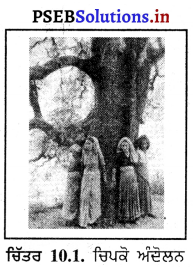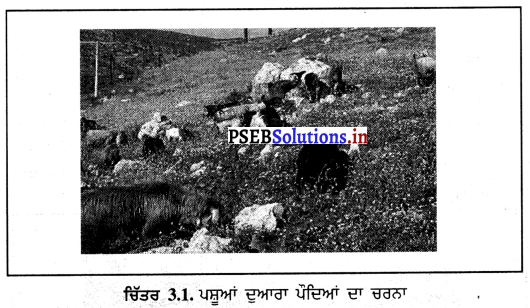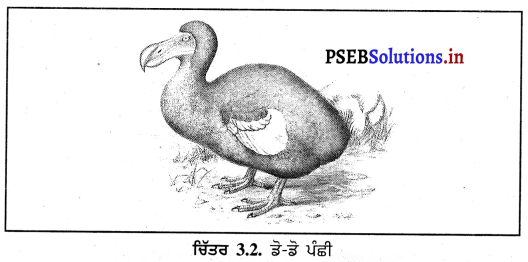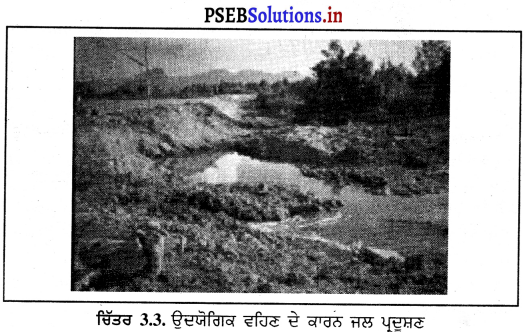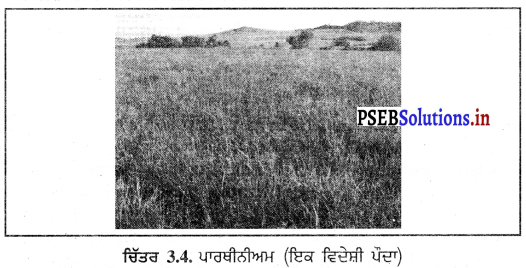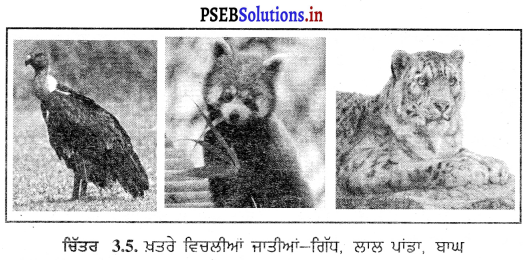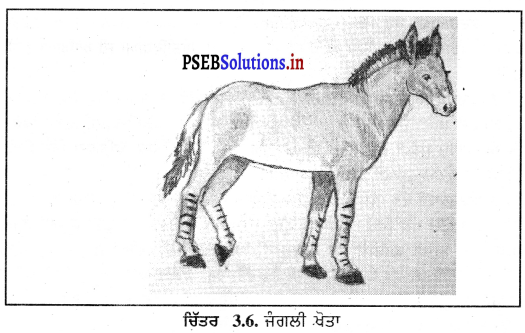Punjab State Board PSEB 12th Class Environmental Education Book Solutions Chapter 11 ਕਾਇਮ ਰਹਿਣਯੋਗ / ਝੱਲਣਯੋਗ / ਟਿਕਾਊ ਖੇਤੀਬਾੜੀ (ਭਾਗ-1) Textbook Exercise Questions and Answers.
PSEB Solutions for Class 12 Environmental Education Chapter 11 ਕਾਇਮ ਰਹਿਣਯੋਗ / ਝੱਲਣਯੋਗ / ਟਿਕਾਊ ਖੇਤੀਬਾੜੀ (ਭਾਗ-1)
Environmental Education Guide for Class 12 PSEB ਕਾਇਮ ਰਹਿਣਯੋਗ / ਝੱਲਣਯੋਗ / ਟਿਕਾਊ ਖੇਤੀਬਾੜੀ (ਭਾਗ-1) Textbook Questions and Answers
ਛੋਟੇ ਉੱਤਰਾਂ ਵਾਲੇ ਪ੍ਰਸ਼ਨ (Short Answer Type Questions)
ਪ੍ਰਸ਼ਨ 1.
ਕਾਇਮ ਰਹਿਣਯੋਗ/ਝੱਲਣਯੋਗ/ਟਿਕਾਊ ਖੇਤੀ ਬਾੜੀ ਦੀ ਪਰਿਭਾਸ਼ਾ ਲਿਖੋ ।
ਉੱਤਰ-
ਪਰਿਸਥਿਤਿਕ ਤੌਰ ‘ਤੇ ਸਿਹਤਮੰਦ, ਆਰਥਿਕ ਪੱਖੋਂ ਪਲਰਨ ਯੋਗ ਅਤੇ ਸਮਾਜਿਕ ਤੌਰ ‘ਤੇ ਠੀਕ, ਸੱਭਿਆਚਾਰਕ ਪੱਖ ਤੋਂ ਢੁੱਕਵੀਂ ਅਤੇ ਵਿਗਿਆਨਿਕ ਪਹੁੰਚ ‘ਤੇ ਠੀਕ ਉਤਰਨ ਵਾਲੀ ਖੇਤੀਬਾੜੀ ਨੂੰ ਕਾਇਮ ਰਹਿਣਯੋਗ/ਝੱਲਣਯੋਗ ਖੇਤੀਬਾੜੀ ਆਖਦੇ ਹਨ ।
ਤੋਂ ਦੀ ਵਰਤੋਂ ਕਰਨ ਦੇ ਤਰੀਕਿਆਂ ਵਿਚ ਆਈ ਮੌਜੂਦਾ ਤਬਦੀਲੀ ਦੇ ਕਾਰਨ ਅਤੇ ਕੁਦਰਤੀ ਸਾਧਨਾਂ ਦੀ ਲੋੜ ਨਾਲੋਂ ਜ਼ਿਆਦਾ ਵਰਤੋਂ ਕਰਨ ਕਰਕੇ ਅਸਥਿਰਤਾ ਪੈਦਾ ਹੋ ਗਈ ਹੈ । ਸਾਡੀਆਂ ਆਉਣ ਵਾਲੀਆਂ ਪੀੜ੍ਹੀਆਂ ਦੀਆਂ ਜ਼ਰੂਰਤਾਂ ਪੂਰੀਆਂ ਕਰਨ ਵਾਸਤੇ ਸਾਨੂੰ ਕੁਦਰਤੀ ਸਾਧਨਾਂ ਦਾ ਸੁਰੱਖਿਅਣ ਅਤੇ ਸਾਂਭ-ਸੰਭਾਲ ਕਰਨੀ ਪਵੇਗੀ ।
ਮਾਨਵਤਾ ਦੀਆਂ ਬਦਲ ਰਹੀਆਂ ਜ਼ਰੂਰਤਾਂ, ਵਾਤਾਵਰਣ ਦੀ ਉੱਨਤੀ ਨੂੰ ਕਾਇਮ ਰੱਖਣ ਅਤੇ ਉੱਨਤ ਕਰਨ ਦੇ ਸਮੇਤ ਕੁਦਰਤੀ ਸਾਧਨਾਂ ਦੀ ਸੁਰੱਖਿਆ ਅਤੇ ਸਾਂਭ-ਸੰਭਾਲ ਨੂੰ ਝੱਲਣਯੋਗ/ਟਿਕਾਊ ਖੇਤੀਬਾੜੀ ਕਹਿੰਦੇ ਹਨ ।
![]()
ਪ੍ਰਸ਼ਨ 2.
ਆਰਗੈਨਿਕ ਕਿਰਸਾਣੀ (Organic farming) ਕਾਇਮ ਰਹਿਣਯੋਗ/ਝੱਲਣਯੋਗ/ ਟਿਕਾਊ ਜ਼ਰਾਇਤ ਤੋਂ ਕਿਵੇਂ ਭਿੰਨ ਹੈ ?
ਉੱਤਰ-
ਕਾਰਬਨੀ ਕਿਰਸਾਣੀ ਇਕ ਅਜਿਹੀ ਕਿਰਸਾਣੀ ਹੈ ਜਿਸ ਵਿਚ ਕਿਸੇ ਵੀ ਪ੍ਰਕਾਰ ਦੀਆਂ ਅਕਾਰਬਨੀ ਖਾਦਾਂ (Inorganic fertilizers) ਜਾਂ ਕਿਸੇ ਪ੍ਰਕਾਰ ਦੀ ਯੋਗਿਕ ਵਸਤੂ (Additives) ਦੀ ਵਰਤੋਂ ਕਰਨ ‘ਤੇ ਮੁਕੰਮਲ ਪਾਬੰਦੀ ਹੁੰਦੀ ਹੈ ਅਤੇ ਨਾ ਹੀ ਜਾਨਵਰਾਂ ਦੀ ਉਤਪੱਤੀ ਲਈ ਕਿਸੇ ਵੀ ਤਰ੍ਹਾਂ ਦੇ ਐਂਟੀਬਾਇਓਟਿਕਸ ਦੀ ਵਰਤੋਂ ਕਰਨ ‘ਤੇ ਵੀ ਪੂਰਨ ਤੌਰ ‘ਤੇ ਰੋਕ ਲਗਾਈ ਗਈ ਹੈ । ਜਿਨ੍ਹਾਂ ਖੇਤਾਂ ਨੂੰ ਪਿਛਲੇ ਤਿੰਨ ਸਾਲਾਂ ਤੋਂ ਰਸਾਇਣਿਕ ਖਾਦਾਂ ਤੋਂ ਮੁਕਤ ਕੀਤਾ ਗਿਆ ਹੁੰਦਾ ਹੈ ਉਨ੍ਹਾਂ ਦੀ ਪ੍ਰਮਾਣਿਕਤਾ ਜ਼ਰੂਰੀ ਹੈ । ਅਜਿਹੀ ਤਸਦੀਕ ਹੋਣ ਤੋਂ ਬਾਅਦ ਹੀ ਕਿਸਾਨ ਕਾਰਬਨੀ ਫ਼ਸਲਾਂ ਨੂੰ ਮੰਡੀ ਵਿਚ ਲਿਜਾ ਸਕਦਾ ਹੈ । ਪਰ ਝੱਲਣਯੋਗ ਖੇਤੀ ਵਿਚ ਅਜਿਹੀਆਂ ਕੋਈ ਬੰਦਸ਼ਾਂ (Restrictions) ਨਹੀਂ ਹਨ ।
ਅੰਤਰਾਂ ਦੀ ਸਾਰਨੀ
| ਕਾਰਬਨੀ ਕਿਰਸਾਣੀ (Organic Farming) | ਕਾਇਮ ਰਹਿਣਯੋਗ ਜ਼ਰਾਇਤ (Sustainable Agriculture) |
| 1. ਕਾਰਬਨੀ ਕਿਰਸਾਣੀ ਵਿੱਚ ਸੰਸ਼ਲਿਸ਼ਟ ਖਾਦਾਂ ਦੀ ਵਰਤੋਂ ਨਹੀਂ ਕੀਤੀ ਜਾ ਸਕਦੀ । | 1. ਕਾਇਮ ਰਹਿਣ ਯੋਗ ਜ਼ਰਾਇਤ ਵਿੱਚ ਸੰਸ਼ਲਿਸਟ ਖਾਦਾਂ ਦੀ ਵਰਤੋਂ ਕੀਤੀ ਜਾ ਸਕਦੀ ਹੈ । |
| 2. ਅਕਾਰਬਨੀ ਖਾਦਾਂ ਦੀ ਵਰਤੋਂ ਕਰਨੀ ਵਰਜਿਤ ਹੈ । | 2. ਅਕਾਰਬਨੀ ਖਾਦਾਂ ਦੀ ਵਰਤੋਂ ਕਰਨ ਤੇ ਕਿਸੇ ਪ੍ਰਕਾਰ ਦੀ ਪਾਬੰਦੀ ਨਹੀਂ ਹੈ । |
| 3. ਕਾਰਬਨੀ ਕਿਰਸਾਣੀ ਦੁਆਰਾ ਤਿਆਰ ਕੀਤੀਆਂ ਗਈਆਂ ਫ਼ਸਲਾਂ ਦਾ ਪ੍ਰੀਖਣ ਕਰਨਾ ਕਿ ਪਿਛਲੇ ਤਿੰਨ ਸਾਲਾਂ ਤੋਂ ਅਕਾਰਬਨੀ ਖਾਦਾਂ ਤਾਂ ਨਹੀਂ ਵਰਤੀਆਂ ਗਈਆਂ ਜ਼ਰੂਰੀ ਹੈ । | 3. ਇਸ ਜ਼ਰਾਇਤਾਂ ਤੇ ਕੋਈ ਅਜਿਹੀ ਬੰਦਸ਼ ਨਹੀਂ ਹੈ । |
ਪ੍ਰਸ਼ਨ 3.
ਹਰੇ ਇਨਕਲਾਬ (Green Revolution) ਦੀ ਕੀ ਲੋੜ ਸੀ ?
ਜਾਂ
ਹਰੀ ਕ੍ਰਾਂਤੀ ਦੀ ਕੀ ਲੋੜ ਸੀ ?
ਉੱਤਰ-
ਸਜੀਵਾਂ ਦੇ ਜਿਊਂਦੇ ਰਹਿਣ ਦੇ ਲਈ ਖ਼ੁਰਾਕ ਇਕ ਮੁੱਢਲੀ ਜ਼ਰੂਰਤ ਹੈ । ਮਾਨਵ ਦੇ ਸੱਭਿਅਤਾ ਵਾਲੇ ਜੀਵਨ ਦੀ ਕਹਾਣੀ ਵਿਚ ਖੇਤੀਬਾੜੀ ਹੀ ਅਜਿਹਾ ਬਦਲਾਉ ਬਿੰਦੂ (Turning point) ਹੀ ਸੀ, ਜਿਸਨੇ ਮਾਨਵ ਦੀ ਭੋਜਨ ਚੁਣਨ ਵਾਲੀ ਜੀਵਨ ਸ਼ੈਲੀ ਨੂੰ ਇਕ ਜਗ੍ਹਾ ‘ਤੇ ਸਥਿਰ ਰਹਿਣ ਵਾਲੀ ਜੀਵਨ ਸ਼ੈਲੀ ਵਿਚ ਤਬਦੀਲ ਕਰ ਦਿੱਤਾ । ਜਾਪਦਾ ਹੈ ਕਿ ਪਿਛਲੇ 200 ਸਾਲਾਂ ਵਿਚ, ਪਹਿਲਾਂ ਦੇ ਮੁਕਾਬਲੇ ਖੇਤੀਬਾੜੀ ਸੰਬੰਧੀ ਕਿਰਿਆਵਾਂ ਵਿਚ ਬੜੀ ਤੇਜ਼ੀ ਨਾਲ ਪਰਿਵਰਤਨ ਆਏ ਹਨ । ਆਜ਼ਾਦੀ ਮਿਲਣ ਦੇ ਫੌਰਨ ਬਾਅਦ ਭਾਰਤ ਨੂੰ ਗਰੀਬੀ ਦੀ ਸਮੱਸਿਆ ਦਾ ਸਾਹਮਣਾ ਕਰਨਾ ਪਿਆ । ਅਨਾਜ ਦੀਆਂ ਫ਼ਸਲਾਂ ਵਿਚ ਨਿਰਭਰਤਾ ਪ੍ਰਾਪਤ ਕਰਨ ਦੇ ਲਈ ਭਾਰਤ ਨੂੰ ਹਰੇ ਇਨਕਲਾਬ ਦੀ ਟੇਕ ਲੈਣੀ ਪਈ । ਸਾਨੂੰ ਪਤਾ ਹੈ ਕਿ ਹਰੇ ਇਨਕਲਾਬ ਦਾ ਮੁੱਖ ਮੰਤਵ ਸੁਧਰੀਆਂ ਹੋਈਆਂ ਕਿਸਮਾਂ ਅਤੇ ਵਧੇਰੇ ਝਾੜ ਦੇਣ ਵਾਲੀਆਂ ਫ਼ਸਲਾਂ ਦੇ ਬੀਜਾਂ ਦੀ ਵਰਤੋਂ, ਖਾਦਾਂ ਦੀ ਵਧੇਰੇ ਵਰਤੋਂ, ਹਾਨੀਕਾਰਕ ਜੀਵਾਂ ਨੂੰ ਨਸ਼ਟ ਕਰਨ ਦੇ ਲਈ ਅਤੇ ਕੀਟਨਾਸ਼ਕਾਂ ਦੀ ਵਰਤੋਂ ਅਤੇ ਸਿੰਜਾਈ ਦੇ ਸੁਚੱਜੇ ਢੰਗ-ਤਰੀਕੇ (ਵਧੇਰੇ ਪਾਣੀ ਦੀ ਵਰਤੋਂ ਅਤੇ ਭੰਡਾਰਨ ਦੇ ਚੰਗੇ ਤਰੀਕੇ ਉਤਪਾਦਨ ਵਿਚ ਵਾਧਾ ਕਰਨਾ ਸੀ ।
ਪ੍ਰਸ਼ਨ 4.
ਭੂਮੀ ਦੀ ਪੌਦਿਆਂ ਲਈ ਕੀ ਮਹੱਤਤਾ ਹੈ ?
ਉੱਤਰ-
ਭੂਮੀ ਦੀ ਪੌਦਿਆਂ ਲਈ ਮਹੱਤਤਾ-ਪੌਦਿਆਂ ਦੇ ਲਈ ਭੂਮੀ ਦੀ ਬਹੁਤ ਮਹੱਤਤਾ ਹੈ ।
1. ਮਾਧਿਅਮ ਵਜੋਂ (As a Medium) – ਪੌਦਿਆਂ, ਫ਼ਸਲਾਂ ਅਤੇ ਬਾਗ਼ਬਾਨੀ ਲਈ ਉਗਾਏ ਜਾਣ ਵਾਲੇ ਪੌਦਿਆਂ ਦੇ ਵਾਸਤੇ ਮਿੱਟੀ ਹੀ ਸਭ ਤੋਂ ਵਧੀਆ ਮਾਧਿਅਮ ਹੈ ਅਤੇ ਇਸ ਮਿੱਟੀ ਦਾ ਮੁੱਖ ਕੰਮ ਇਨ੍ਹਾਂ ਪੌਦਿਆਂ ਦੇ ਵਾਧੇ ਵਿਚ ਸਹਾਇਤਾ ਕਰਨ ਦਾ ਹੈ । ਮਿੱਟੀ ਹੀ ਇਕ ਅਜਿਹਾ ਮਾਧਿਅਮ ਹੈ ਜਿਸ ਦੀ ਵਜ੍ਹਾ ਕਰਕੇ ਫ਼ਸਲਾਂ ਵੱਧਦੀਆਂ-ਫੁਲਦੀਆਂ ਹਨ ਅਤੇ ਵਧੇਰੇ ਪੈਦਾਵਾਰ ਦਿੰਦੀਆਂ ਹਨ । ਮਿੱਟੀ ਦੇ ਕੁਦਰਤੀ ਚੱਕਰ ਪੌਦਿਆਂ ਦੇ ਵਾਧੇ ਲਈ ਢੁੱਕਵਾਂ ਭੌਤਿਕ, ਰਸਾਇਣਿਕ ਅਤੇ ਜੈਵਿਕ ਮਾਧਿਅਮ ਉਪਲੱਬਧ ਕਰਾਉਣ ਵਿਚ ਆਪਣਾ ਯੋਗਦਾਨ ਪਾਉਂਦੇ ਹਨ ।
2. ਪੌਸ਼ਟਿਕ ਪਦਾਰਥਾਂ ਦੀ ਉਪਲੱਬਧੀ (Provides Nutrients) – ਮਿੱਟੀ ਪ੍ਰਾਣੀ ਸਮੂਹ ਦੇ ਲਈ ਮਹੱਤਵਪੂਰਨ ਭੂਮਿਕਾ ਨਿਭਾਉਂਦੀ ਹੈ । ਮਿੱਟੀ ਦੇ ਵਿਚ ਲੱਖਾਂ ਦੀ ਗਿਣਤੀ ਵਿਚ ਸੁਖ਼ਮਜੀਵ ਪਾਏ ਜਾਂਦੇ ਹਨ । ਨਿਰਸੰਦੇਹ ਮਿੱਟੀ ਵਿਚ ਮੌਜੂਦ ਪਾਣੀ ਸਮੂਹ ਅਤੇ ਬਨਸਪਤੀ ਸਮੂਹ ਮਿੱਟੀ ਦੇ ਚੱਕਰਾਂ ਵਿਚ ਸਹਾਇਤਾ ਕਰਦੇ ਹਨ ਜਿਸ ਕਰਕੇ ਰਸਾਇਣਿਕ ਖਾਦਾਂ (Fertilizers) ਦੀ ਵਰਤੋਂ ਕੀਤਿਆਂ ਬਗ਼ੈਰ ਕੁਦਰਤੀ ਬਨਸਪਤੀ ਦੇ ਉੱਗਣ ਵਿਚ ਆਪਣਾ ਯੋਗਦਾਨ ਪਾਉਂਦੇ ਹਨ । ਇਹ ਸਮੁਹ ਹੋਰਨਾਂ ਪ੍ਰਬੰਧਾਂ ਵਿਚ ਵੀ ਸਹਾਇਤਾ ਕਰਦੇ ਹਨ । ਇਹ ਪੌਦਿਆਂ ਦੀ ਰਹਿੰਦ-ਖੂੰਹਦ ਦਾ ਵਿਘਟਨ ਕਰਦੇ ਹਨ, ਵਾਯੂਮੰਡਲ ਵਿਚੋਂ ਅੰਸ਼ ਪ੍ਰਾਪਤ ਕਰਦੇ ਹਨ, ਮਿੱਟੀ ਵਿਚ ਹਵਾ ਦਾ ਸੰਚਾਰਨ ਕਰਦੇ ਹਨ ਅਤੇ ਇਨ੍ਹਾਂ ਤੋਂ ਇਲਾਵਾ ਇਹ ਸਮੂਹ ਕਈ ਹੋਰ ਕਾਰਜ ਕਰਦਿਆਂ ਹੋਇਆਂ ਮਿੱਟੀ ਦੀ ਉਪਜਾਊ ਸ਼ਕਤੀ ਵੀ ਵਧਾਉਂਦੇ ਹਨ । ਇਸ ਵਜ਼ਾ ਕਰਕੇ ਮਿੱਟੀ ਨੂੰ ਇਕ ਚੰਗਾ ਮਾਧਿਅਮ ਮੰਨਿਆ ਗਿਆ ਹੈ ।
3. ਜਲ ਸਪਲਾਈ ਜਾਂ ਜਲ ਪੂਰਤੀ (Water Supply) – ਪਾਣੀ ਦੀ ਸਪਲਾਈ ਗੁਣਵੱਤਾ ਅਤੇ ਪੁਰਤੀ ਦੇ ਲਈ ਮਿੱਟੀ ਮੁੱਖ ਭੂਮਿਕਾ ਨਿਭਾਉਂਦੀ ਹੈ ।
ਜ਼ਮੀਨ ਦਾ ਭੁ ਦ੍ਰਿਸ਼ (Landscape) ਅਤੇ ਉੱਥੇ ਉੱਗਣ ਵਾਲੀ ਬਨਸਪਤੀ ਮੀਂਹ ਦੇ ਉੱਥੇ ਪੈਣ ਵਾਲੇ ਪਾਣੀ ਦੀ ਵੰਡ ਕਰਨ ਲਈ ਜ਼ਿੰਮੇਵਾਰ ਹੈ । ਕੀ ਮੀਂਹ ਦਾ ਇਹ ਪਾਣੀ ਮਿੱਟੀ ਦੀ ਸੜਾ ਤੋਂ ਨਿਕਲ ਜਾਵੇਗਾ, ਕੀ ਇਹ ਪਾਣੀ ਜ਼ਮੀਨ ਉੱਪਰ ਮੌਜੂਦ ਜਲ ਪਿੰਡਾਂ ਜਿਵੇਂ ਕਿ ਝੀਲਾਂ ਅਤੇ ਨਦੀਆਂ ਦੇ ਪਾਣੀ ਦੇ ਪੂਰਕ ਦਾ ਕੰਮ ਕਰੇਗਾ, ਕੀ ਇਹ ਪਾਣੀ ਇਕਦਮ ਆਏ ਹੜ੍ਹ ਦੀ ਸ਼ਕਲ ਵਿਚ ਬੜੀ ਤੇਜ਼ੀ ਨਾਲ ਰੁੜ੍ਹ ਜਾਵੇਗਾ, ਕੀ ਇਹ ਪਾਣੀ ਰੁੱਸ ਕੇ ਤੋਂ ਅੰਦਰ ਚੱਲਿਆ ਜਾਵੇਗਾ, ਜਿੱਥੇ ਇਸ ਦੀ ਵਰਤੋਂ ਮਿੱਟੀ ਵਿਚ ਮੌਜੂਦ ਸਜੀਵ ਅਤੇ ਪੌਦੇ ਕਰਨਗੇ, ਜਾਂ ਇਹ ਪਾਣੀ ਰਿਸਦਾ-ਰਿਸਦਾ ਭੂਮੀ ਜਲ ਸਤਰ (Water Level) ਤਕ ਪੁੱਜ ਜਾਵੇਗਾ ਅਤੇ ਇਸਦੀ ਗਤੀ ਦੀ ਦਰ ਕਿੰਨੀ ਹੋਵੇਗੀ, ਇਹ ਸਾਰਾ ਕੁੱਝ ਮਿੱਟੀ ਦੀ ਰਚਨਾ ਉੱਤੇ ਨਿਰਭਰ ਕਰਦਾ ਹੈ । ਇਸ ਤਰ੍ਹਾਂ ਪਾਣੀ ਦੇ ਚੱਕਰ ਵਿਚ ਮਿੱਟੀ ਦੀ ਵਿਸ਼ੇਸ਼ ਸਥਿਤੀ ਹੈ ।
![]()
ਪ੍ਰਸ਼ਨ 5.
ਭੂਮੀ ਦੀ ਸਾਂਭ-ਸੰਭਾਲ ਦੀ ਕੀ ਲੋੜ ਹੈ ?
ਜਾਂ
ਭੂਮੀ ਦਾ ਸੁਰੱਖਿਅਣ ਕਿਉਂ ਜ਼ਰੂਰੀ ਹੈ ?
ਉੱਤਰ-
ਭੂਮੀ ਮਾਈਕ੍ਰੋ (ਮਹੀਨ ਜਾਂ ਬਹੁਤ ਛੋਟੇ) ਅਤੇ ਮੈਕੋ (ਬਹੁਤ ਵੱਡੇ) ਸਜੀਵਾਂ, ਖਣਿਜਾਂ, ਕਾਰਬਨੀ ਖਾਦਾਂ, ਹਵਾ ਅਤੇ ਪਾਣੀ ਦੇ ਮਿਲਾਪ ਨਾਲ ਬਣੀ ਹੋਈ ਹੈ । ਭੂਮੀ ਇਕ
ਜੀਵਤ ਪ੍ਰਣਾਲੀ (Living system) ਹੈ ਜਿਹੜੀ ਜੀਵਨ ਲਈ ਬੁਨਿਆਦੀ ਕਾਰਜ ਕਰਦੀ ਹੈ । ਭੂਮੀ ਦੇ ਇਨ੍ਹਾਂ ਲਾਹੇਵੰਦ ਕਾਰਜ ਵਿਚ ਇਹ ਸ਼ਾਮਿਲ ਹਨ-
- ਖ਼ੁਰਾਕ ਅਤੇ ਰੇਸ਼ੇ ਪ੍ਰਾਪਤ ਕਰਨ ਦੇ ਲਈ ਅਸੀਂ ਪੌਦੇ ਉਪਜਾਊ ਭੂਮੀ ਵਿਚ ਹੀ ਉਗਾਉਂਦੇ ਹਾਂ ।
- ਤਾਪ ਅਤੇ ਪਾਣੀ ਨੂੰ ਸਟੋਰ ਕਰਨਾ |
- ਕਰੋੜਾਂ ਦੀ ਸੰਖਿਆ ਵਿਚ ਪੌਦਿਆਂ, ਪ੍ਰਾਣੀਆਂ ਅਤੇ ਸੂਖਮ ਜੀਵਾਂ ਲਈ ਆਵਾਸ (ਘਰ) ਦਾ ਪ੍ਰਬੰਧ ਕਰਨਾ ।
- ਪਾਣੀ ਅਤੇ ਫੋਕਟ ਪਦਾਰਥਾਂ ਦਾ ਫਿਲਟਰੀਕਰਣ ।
- ਨਿਰਮਾਣ, ਦਵਾਈਆਂ, ਸੂਖ਼ਮਕਲਾ (Art) ਅਤੇ ਸ਼ਿੰਗਾਰ ਦੇ ਸਾਮਾਨ ਲਈ ਸ੍ਰੋਤ ਉਪਲੱਬਧ ਕਰਾਉਣਾ ।
- ਕਚਰੇ ਦਾ ਵਿਘਟਣ ਕਰਨਾ ।
ਵੱਡੇ ਉੱਤਰਾਂ ਵਾਲੇ ਪ੍ਰਸ਼ਨ (Long Answer Type Questions)
ਪ੍ਰਸ਼ਨ 1.
ਕਾਇਮ ਰਹਿਣਯੋਗ/ਬੁੱਲਣਯੋਗ/ਟਿਕਾਊ ਖੇਤੀ ਦੀ ਕੀ ਜ਼ਰੂਰਤ ਹੈ ?
ਉੱਤਰ-
ਪਰਿਸਥਿਤਿਕ ਤੌਰ ‘ਤੇ ਸਿਹਤਮੰਦ, ਆਰਥਿਕ ਪੱਖੋਂ ਪਲਰਨਯੋਗ, ਅਤੇ ਸਮਾਜਿਕ ਤੌਰ ‘ਤੇ ਠੀਕ, ਸੱਭਿਆਚਾਰਕ ਦੇ ਪੱਖੋਂ ਢੁੱਕਵੀਂ ਅਤੇ ਵਿਗਿਆਨਿਕ ਪਹੁੰਚ ‘ਤੇ ਠੀਕ ਉਤਰਨ ਵਾਲੀ ਖੇਤੀਬਾੜੀ ਨੂੰ ਝੱਲਣਯੋਗ/ਟਿਕਾਊ ਖੇਤੀਬਾੜੀ ਆਖਦੇ ਹਨ । ਦੂਜੇ ਸ਼ਬਦਾਂ ਵਿਚ ਝੱਲਣਯੋਗ ਖੇਤੀਬਾੜੀ ਦੀ ਵਰਤੋਂ ਇਕ ਅਜਿਹੀ ਪ੍ਰਣਾਲੀ ਅਤੇ ਵਿਧੀ ਹੈ ਜਿਹੜੀ ਜਾਂ ਤਾਂ ਕਾਇਮ ਰੱਖਦੀ ਹੈ ਜਾਂ ਵਧਾਉਂਦੀ ਹੈ ।
- ਪਲਰਨਯੋਗ ਆਰਥਿਕ ਖੇਤੀਬਾੜੀ ਉਤਪਾਦਨ ।
- ਬਹੁਤ ਚੰਗੇ ਆਧਾਰ ਵਾਲੇ ਕੁਦਰਤੀ ਸਾਧਨ ।
- ਦੂਸਰੀਆਂ ਪਰਿਸਥਿਤਿਕ ਪ੍ਰਣਾਲੀਆਂ ਜਿਨ੍ਹਾਂ ‘ਤੇ ਖੇਤੀਬਾੜੀ ਨਾਲ ਸੰਬੰਧਿਤ ਗਤੀਵਿਧੀਆਂ ਦਾ ਅਸਰ ਪੈਂਦਾ ਹੈ ।
ਖੇਤੀਬਾੜੀ ਜਿਨ੍ਹਾਂ ਤਿੰਨ ਮੁੱਖ ਟੀਚਿਆਂ ਨੂੰ ਜੋੜਦੀ ਹੈ, ਉਹ ਟੀਚੇ ਹਨ-ਨਰੋਆ ਵਾਤਾਵਰਣ, ਆਰਥਿਕ ਲਾਹੇਵੰਦੀ ਅਤੇ ਸਮਾਜਿਕ ਤੇ ਆਰਥਿਕ ਨਿਆਇ ਸੰਗਤੀ (Equity) ਝੱਲਣਯੋਗ ਖੇਤੀਬਾੜੀ ਦੇ ਕੁੱਝ ਮੁੱਢਲੇ ਅਸੂਲ ਇਹ ਹਨ-
- ਲੰਮੇ ਸਮੇਂ ਦੇ ਬਾਅਦ ਫਾਰਮ ਦੀ ਉਤਪਾਦਕਤਾ ਵਿਚ ਵਾਧਾ ਹੁੰਦਾ ਹੈ ।
- ਕੁਦਰਤੀ ਸਾਧਨਾਂ ਉੱਤੇ ਮਾੜੇ ਪ੍ਰਭਾਵ ਘੱਟ ਤੋਂ ਘੱਟ ਪੈਂਦੇ ਹਨ ।
- ਖੇਤੀਬਾੜੀ ਵਿਚ ਵਰਤੇ ਜਾਣ ਵਾਲੇ ਰਸਾਇਣਾਂ ਦੀ ਰਹਿੰਦ-ਖੂੰਹਦ ਦੀ ਪੱਧਰ ਬਹੁਤ ਹੀ ਨੀਵੀਂ ਹੁੰਦੀ ਹੈ ।
- ਜ਼ਮੀਨ ਹੇਠਲੇ ਪਾਣੀ ਦਾ ਨੁਕਸਾਨ ਘੱਟ ਤੋਂ ਘੱਟ ਹੁੰਦਾ ਹੈ ।
- ਭੋਂ-ਖੋਰ ਨੂੰ ਰੋਕਿਆ ਜਾਂਦਾ ਹੈ ।
- ਭੂਮੀਗਤ ਪਾਣੀ ਦੇ ਜਾਇਆ ਜਾਣ ਨੂੰ ਘਟਾਇਆ ਜਾ ਸਕਦਾ ਹੈ ।
ਏਕੀਕ੍ਰਿਤ ਪੈਸਟ ਪ੍ਰਬੰਧਣ [Integrated Pest Control Management (IPM)], ਪੈਸਟਾਂ ਤੋਂ ਹੋਣ ਵਾਲੇ ਨੁਕਸਾਨ ਨੂੰ ਘਟਾਉਣ ਦੇ ਮੰਤਵ ਨਾਲ ਫ਼ਸਲੀ ਚੱਕਰ (Crop rotation), ਨਰੋਈਆਂ ਫ਼ਸਲਾਂ, ਮਿੱਟੀ ਖੁਰਨ ਨੂੰ ਘਟਾਉਣਾ, ਜੁਤਾਈ (Tillage) ਅਤੇ ਅਜਿਹੀਆਂ ਯੋਜਨਾਵਾਂ ਤਿਆਰ ਕਰਨੀਆਂ, ਜਿਹੜੀ ਭੋਂ-ਖੁਰਨ ਅਤੇ ਨਦੀਨਾਂ ‘ਤੇ ਕੰਟਰੋਲ ਕਰਨ ਦੇ ਵਾਸਤੇ ਉਪਰੋਕਤ ਵਿਧੀਆਂ ਦੀ ਲੜੀ ਵਿਚ ਸ਼ਾਮਿਲ ਹਨ । ਕਾਇਮ ਰਹਿਣਯੋਗ ਖੇਤੀਬਾੜੀ ਦੀ ਇਹ ਕੋਸ਼ਿਸ਼ ਹੈ ਕਿ ਹਲ ਚਲਾਉਣ ਦੇ ਤਰੀਕਿਆਂ ਦੀ ਸੋਧ ਕਰਕੇ, ਪਾਣੀ ਦੀ ਸਪਲਾਈ ਦੀ ਸਾਂਭ-ਸੰਭਾਲ ਕਰਕੇ ਜੇਕਰ ਮੁਕੰਮਲ ਤੌਰ ‘ਤੇ ਖ਼ਤਮ ਨਾ ਕੀਤਾ ਜਾ ਸਕੇ ਤਾਂ ਬਨਾਉਟੀ ਖਾਦਾਂ ਦੀ ਖ਼ਪਤ ਅਤੇ ਹਾਨੀਕਾਰਕ ਜੀਵਨਾਸ਼ਕਾਂ ਦੀ ਵਰਤੋਂ ਨੂੰ ਘੱਟ ਕਰਨਾ ਭੁੱਲਣਯੋਗ ਖੇਤੀਬਾੜੀ ਦੀ ਇਕ ਕੋਸ਼ਿਸ਼ ਹੈ ।
ਪ੍ਰਸ਼ਨ 2.
ਕਾਇਮ ਰਹਿਣਯੋਗ/ਝੱਲਣਯੋਗ/ਟਿਕਾਊ ਖੇਤੀ ਦੀਆਂ ਮੁੱਢਲੀਆਂ ਕਿਰਿਆਵਾਂ ਬਾਰੇ ਲਿਖੋ ।
ਉੱਤਰ-
ਖੇਤੀਬਾੜੀ ਦੀਆਂ ਮੁੱਢਲੀਆਂ ਪ੍ਰਕਿਰਿਆਵਾਂ-
- ਖੇਤੀ (ਫਾਰਮ) ਦੀ ਉਤਪਾਦਕਤਾ ਨੂੰ ਲੰਮੇ ਸਮੇਂ ਤਕ ਵਧਾਉਣਾ ।
- ਕੁਦਰਤੀ ਸਾਧਨਾਂ ਉੱਤੇ ਪੈਣ ਵਾਲੇ ਮਾੜੇ ਅਸਰਾਂ ਨੂੰ ਘੱਟ ਤੋਂ ਘੱਟ ਕਰਨਾ ।
- ਖੇਤੀਬਾੜੀ ਲਈ ਵਰਤੇ ਜਾਂਦੇ ਰਸਾਇਣਾਂ ਦੀ ਘੱਟ ਤੋਂ ਘੱਟ ਵਰਤੋਂ ਕਰਨਾ ।
- ਜ਼ਰਾਇਤ ਤੋਂ ਪ੍ਰਾਪਤ ਹੋਣ ਵਾਲੇ ਸਮਾਜੀ ਲਾਭ (ਵਿੱਤੀ ਅਤੇ ਗੈਰ ਵਿੱਤੀ ਸ਼ਕਲ ਵਿਚ) ਨੂੰ ਘੱਟ ਤੋਂ ਘੱਟ ਪੱਧਰ ‘ਤੇ ਰੱਖਣਾ ।
- ਭੋਂ-ਖੁਰਨ ਨੂੰ ਰੋਕਣਾ ਅਤੇ
- ਜ਼ਮੀਨ ਹੇਠਲੇ ਪਾਣੀ ਦੀ ਹਾਨੀ ਨੂੰ ਘਟਾਉਣਾ ।
ਪ੍ਰਸ਼ਨ 3.
ਹਰੇ ਇਨਕਲਾਬ ਦੇ ਵਾਤਾਵਰਣ ਉੱਪਰ ਪਏ ਕੁਝ ਪ੍ਰਭਾਵਾਂ ਦਾ ਵਰਣਨ ਕਰੋ ।
मां
ਹਰੇ ਇਨਕਲਾਬ ਦੇ ਵਾਤਾਵਰਣ ‘ਤੇ ਪੈਣ ਵਾਲੇ ਪ੍ਰਭਾਵਾਂ ਬਾਰੇ ਤੁਸੀਂ ਕੀ ਜਾਣਦੇ ਹੋ ?
मां
ਹਰੇ ਇਨਕਲਾਬ ਦੇ ਵਾਤਾਵਰਣ ‘ਤੇ ਪੈਣ ਵਾਲੇ ਪ੍ਰਭਾਵਾਂ ਬਾਰੇ ਆਪਣੇ ਵਿਚਾਰ ਪ੍ਰਗਟ ਕਰੋ ।
ਉੱਤਰ-
ਸਾਨੂੰ ਪਤਾ ਹੈ ਕਿ ਹਰੇ ਇਨਕਲਾਬ ਦਾ ਉਦੇਸ਼ ਵਧੇਰੇ ਝਾੜ ਦੇਣ ਵਾਲੇ ਬੀਜਾਂ ਦੀ ਵਰਤੋਂ, ਬਨਾਉਟੀ ਖਾਦਾਂ (ਫਰਟੀਲਾਈਜ਼ਰਜ਼ ਅਤੇ ਪੈਸਟ ਨਾਸ਼ਕਾਂ ਦਾ ਜ਼ਿਆਦਾ ਨਿਵੇਸ਼, ਪਾਣੀ ਦੀ ਵਧੇਰੇ ਵਰਤੋਂ ਕਰਕੇ ਉਤਪਾਦਕਤਾ ਵਿਚ ਵਾਧਾ ਕਰਨਾ ਹੈ । ਖਾਧ ਪਦਾਰਥਾਂ ਦੇ ਮਾਮਲੇ ਵਿਚ ਭਾਰਤ ਨੂੰ ਸਵੈ ਨਿਰਭਰ ਬਣਾਉਣਾ ਅਤੇ ਲੋੜ ਨਾਲੋਂ ਜ਼ਿਆਦਾ ਉਤਪਾਦਨ ਕਰਨ ਦਾ ਸਿਹਰਾ ਹਰੇ ਇਨਕਲਾਬ ਦੇ ਸਿਰ ਜਾਂਦਾ ਹੈ । ਪਰ ਹਰੀ ਕ੍ਰਾਂਤੀ ਦੇ ਕਾਰਨ ਕੁੱਝ ਮਾੜੇ ਪ੍ਰਭਾਵ ਵੀ ਸਾਹਮਣੇ ਆਏ ਹਨ ।
ਪੰਜਾਬ ਵਿਚ ਹਰੇ ਇਨਕਲਾਬ ਦੇ ਸਭ ਤੋਂ ਚੰਗੇ ਅਤੇ ਸਭ ਤੋਂ ਭੈੜੇ ਪ੍ਰਭਾਵ ਵੀ ਵੇਖਣ ਵਿਚ ਆਏ ਹਨ । ਹਰੇ ਇਨਕਲਾਬ ਦਾ ਸਮਾਂ ਜਿਹੜਾ ਕਿ ਅਸਲ ਵਿਚ ‘ਬੀਜ ਅਤੇ ਫਰਟੀਲਾਈਜ਼ਰ ਪੈਕੇਜ਼’ (Seed-fertilizer package) ਦਾ ਸਮਾਂ ਹੈ, ਦੇ ਦੌਰਾਨ ਪੰਜਾਬ ਵਿਚ ਬਨਾਉਟੀ ਖਾਦਾਂ ਦੀ ਵਰਤੋਂ ਵਿਚ ਤਿੰਨ ਗੁਣਾਂ ਵਾਧਾ ਹੋਇਆ । ਪਰ ਅੱਜ-ਕਲ੍ਹ ਇਨ੍ਹਾਂ ਖਾਦਾਂ ਦੇ ਅਸਰ ਹਰ ਜਗਾ ਵੇਖੇ ਜਾ ਸਕਦੇ ਹਨ । ਇਹ ਅਸਰ ਹਨ-
1. ਪੌਸ਼ਟਿਕ ਤੱਤਾਂ ਦੀ ਘਾਟ (Nutrient Deficiency) – ਅਸਲ ਵਿਚ ਪੌਦਿਆਂ ਨੂੰ ਐੱਨ. ਪੀ. ਕੇ. (Nitrogen, Phosphorous ਅਤੇ Potassium) ਨਾਲੋਂ ਹੋਰਨਾਂ ਤੱਤਾਂ ਦੀ ਵਧੇਰੇ ਜ਼ਰੂਰਤ ਹੈ । ਪੌਦਿਆਂ ਨੂੰ ਜ਼ਿੰਕ, ਲੋਹਾ, ਤਾਂਬਾ, ਮੈਂਗਨੀਜ਼, ਮੈਗਨੀਸ਼ੀਅਮ, ਮੋਲਿਬਡਿਨਮ ਅਤੇ ਬੋਰਾਂਨ ਵਰਗੇ ਲੇ ਪੌਸ਼ਟਿਕਾਂ (Micro Nutrients) ਦੀ ਵੀ ਜ਼ਰੂਰਤ ਹੈ । ਪੰਜਾਬ ਵਿਚ ਉਪਰੋਕਤ ਲਘੁ ਪੌਸ਼ਟਿਕ ਤੱਤਾਂ ਵਿਚੋਂ ਜ਼ਿੰਕ ਦੀ ਘਾਟ ਸਭ ਤੋਂ ਜ਼ਿਆਦਾ ਹੈ । ਜਿਸ ਦੇ ਕਾਰਨ ਐੱਨ.ਪੀ.ਕੇ. ਦੀ ਵਧੇਰੇ ਵਰਤੋਂ ਨੇ ਧਾਨ ਅਤੇ ਕਣਕ ਦੇ ਝਾੜ ਵਿਚ ਮਿਲਦੇ-ਜੁਲਦੇ ਨਤੀਜੇ ਨਹੀਂ ਵਿਖਾਏ । ਪੰਜਾਬ ਵਿਚ ਧਾਨ ਅਤੇ ਕਣਕ ਦੀ ਉਤਪਾਦਕਤਾ ਅਸਥਿਰਤਾ ਦਰਸਾਉਂਦੀ ਹੈ ਅਤੇ ਪੰਜਾਬ ਦੇ ਕਈ ਜ਼ਿਲਿਆਂ ਵਿਚ ਇਹਨਾਂ ਫ਼ਸਲਾਂ ਦੇ ਝਾੜ ਵਿੱਚ ਕਮੀ ਵੀ ਵੇਖਣ ਵਿਚ ਆਈ ਹੈ । ਭਾਵੇਂ ਕਿ ਫਰਟੀਲਾਈਜ਼ਰਜ਼ ਦੀ ਵਰਤੋਂ ਵਿਚ ਵੀ ਵਾਧਾ ਕੀਤਾ ਗਿਆ ਹੈ ।
2. ਭੂਮੀ ਦੀ ਵਰਤੋਂ ਦੇ ਤਰੀਕੇ ਵਿਚ ਬਦਲਾਵ (Change in land use Pattem) – ਹਰੇ ਇਨਕਲਾਬ ਨੇ ਕਣਕ ਅਤੇ ਧਾਨ ਦੀ ਇਕ ਫ਼ਸਲੀ ਖੇਤੀ (Monoculture) ਨੂੰ ਲੈ ਆਂਦਾ ਹੈ ਅਤੇ ਇਹ ਦੋਵੇਂ ਫ਼ਸਲਾਂ ਭੂਮੀਗਤ ਪੌਸ਼ਟਿਕ ਪਦਾਰਥਾਂ ਦੇ ਸਖਣਿਆਉਣ ਲਈ ਜ਼ਿੰਮੇਵਾਰ ਮੰਨੀਆਂ ਜਾਂਦੀਆਂ ਹਨ । ਇਨ੍ਹਾਂ ਦੋਵਾਂ ਫ਼ਸਲਾਂ ਨੇ ਮੱਕੀ, ਬਾਜਰਾ, ਦਾਲਾਂ ਅਤੇ ਤੇਲ ਬੀਜਾਂ ਵਾਲੀਆਂ ਵੱਖ-ਵੱਖ ਤਰ੍ਹਾਂ ਦੀਆਂ ਪਰੰਪਰਾਗਤ ਫ਼ਸਲਾਂ ਦੀ ਥਾਂ ਲੈ ਲਈ ਹੈ । ਫਲੀਦਾਰ ਫ਼ਸਲਾਂ (Leguminous crops) ਦੀ ਬਿਜਾਈ ਦੀ ਘਾਟ ਕਾਰਨ ਮਿੱਟੀ ਦੀ ਕੁਦਰਤੀ ਤਰੀਕੇ ਨਾਲ ਉਪਜਾਊ ਸ਼ਕਤੀ ਵਿਚ ਵਾਧੇ ਕਰਨ ਵਾਲੇ ਕੁਦਰਤੀ ਏਜੰਟਾਂ ਨੂੰ ਘਟਾਇਆ ਹੈ । ਕਣਕ ਅਤੇ ਧਾਨ ਦੀ ਵਾਰ-ਵਾਰ ਕੀਤੀ ਜਾਣ ਵਾਲੀ ਕਾਸ਼ਤ ਕਾਰਨ ਮਿੱਟੀ ਵਿਚਲੇ ਪੌਸ਼ਟਿਕ ਪਦਾਰਥਾਂ ਵਿਚ ਕਮੀ ਆਈ ਹੈ । ਖੇਤੀ ਵਾਲੀ ਜ਼ਮੀਨ ਦੀ ਵਰਤੋਂ ਵਿਚ ਆਇਆ ਬਦਲਾਵ ਫਲੀਦਾਰ ਪੌਦਿਆਂ ਤੋਂ ਕਣਕ ਅਤੇ ਧਾਨ ਦੀਆਂ ਫ਼ਸਲਾਂ ਵਲ ਅਤੇ ਅੰਤ ਵਿਚ ਬੰਜਰ ਜ਼ਮੀਨ ਵੇਲ ਹੈ ।
3. ਲੋੜ ਤੋਂ ਵੱਧ ਸਿੰਜਾਈ (Intensive Irrigation) – ਲੋੜ ਤੋਂ ਵੱਧ ਸਿੰਚਾਈ ਹਰੀ ਕ੍ਰਾਂਤੀ ਦਾ ਮੁੱਖ ਅੰਸ਼ ਰਹੀ ਹੈ । ਪਾਣੀ ਦੀ ਵੱਧਦੀ ਹੋਈ ਮੰਗ ਨੇ ਪੰਜਾਬ ਦੀ ਜ਼ਮੀਨ ਹੇਠਲੇ ਪਾਣੀ ਦੇ ਸਾਧਨਾਂ ਉੱਤੇ ਕਾਫ਼ੀ ਦਬਾਓ ਪਾਇਆ ਹੈ । ਪੰਜਾਬ ਦੀ ਧਰਤੀ ਹੇਠਲੇ ਪਾਣੀ ਦਾ 80% ਹਿੱਸਾ ਅੱਜ-ਕਲ੍ਹ ਖੇਤੀ ਦੇ ਕੰਮਾਂ ਲਈ ਵਰਤਿਆ ਜਾ ਰਿਹਾ ਹੈ ।
ਜਲ ਨਿਕਾਸ (Drainage) ਵਲ ਉੱਚਿਤ ਧਿਆਨ ਨਾ ਦਿੰਦਿਆਂ ਹੋਇਆਂ ਹੋਰ ਜ਼ਿਆਦਾ ਸਿੰਜਾਈ ਕਰਨ ਦੇ ਨਤੀਜੇ ਖ਼ਤਰਨਾਕ ਸਿੱਧ ਹੋ ਸਕਦੇ ਹਨ । ਧਰਤੀ ਹੇਠਲੇ ਪਾਣੀ ਦੀ ਪੱਧਰ ਤਾਂ ਹੀ ਉੱਚੀ ਹੋ ਸਕਦੀ ਹੈ ਜੇਕਰ ਪਾਣੀ ਦੇ ਸ੍ਰੋਤਾਂ ਨੂੰ, ਪਾਣੀ ਦੀ ਵਰਤੋਂ ਦੇ ਮੁਕਾਬਲੇ ਤੇਜ਼ੀ ਨਾਲ ਪੁਨਰਜੀਵਿਤ (Recharge) ਕੀਤਾ ਜਾਵੇ । ਦੂਸਰੇ ਪਾਸੇ ਸੇਮ ਨਾਲ ਨਮਕੀਨੀਕਰਨ/ (Salinisation) ਦੀ ਸਮੱਸਿਆ ਵੀ ਜੁੜੀ ਹੋਈ ਹੈ । ਨਮਕੀਨੀਕਰਨ ਦੁਆਰਾ ਪੈਦਾ ਹੋਣ ਵਾਲਾ ਪ੍ਰਦੂਸ਼ਣ ਮਿੱਟੀ ਤੋਂ ਦੀ ਉਤਪਾਦਕਤਾ ਨੂੰ ਘਟਾਉਂਦਾ ਤਾਂ ਹੈ ਹੀ, ਪਰ ਕਈ ਵਾਰ ਇਹ ਲੂਣ ਭੋਂ ਨੂੰ ਸਥਾਈ ਤੌਰ ‘ਤੇ ਹਮੇਸ਼ਾ ਲਈ ਤਬਾਹ ਵੀ ਕਰ ਦਿੰਦਾ ਹੈ । ਸੇਮ ਅਤੇ ਨਮਕੀਨੀਕਰਨ ਦੋਵੇਂ ਰਲ ਕੇ ਮਾਰੂਥਲ ਉਤਪੱਤੀ (Desertification) ਵੀ ਕਰ ਸਕਦੇ ਹਨ । ਹਰਾ ਇਨਕਲਾਬ ਕਿਰਸਾਣੀ (Green Revolution Farming) ਨੂੰ ਕਾਮਯਾਬ ਕਰਨ ਦੇ ਮੰਤਵ ਨਾਲ ਜ਼ਮੀਨ ਹੇਠਲੇ ਪਾਣੀ ਦੀ ਸਿੰਚਾਈ ਕਰਨ ਦੇ ਲਈ ਲੋੜ ਨਾਲੋਂ ਵਧੇਰੇ ਵਰਤੋਂ ਕਰਨ ਦੇ ਫਲਸਰੂਪ ਪੰਜਾਬ ਦੇ ਪਾਕ੍ਰਿਤਿਕ ਸਾਧਨ ਸੰਪੰਨੇ (Rich) ਕਛਾਰੀ ਮੈਦਾਨ (Alluvial plains), ਗੰਭੀਰਤਾ ਨਾਲ ਮਾਰੂਥਲ ਵਿਚ ਤਬਦੀਲ ਹੋ ਰਹੇ ਹਨ ।
4. ਰਸਾਇਣਾਂ ਦੀ ਵਰਤੋਂ (Use of Chemicals) – ਸਿੰਜਾਈ ਤੋਂ ਇਲਾਵਾ ਹਰੇ ਇਨਕਲਾਬ ਕਿਸਮ ਦੀ ਖੇਤੀਬਾੜੀ ਨੂੰ ਰਸਾਇਣਾਂ ਅਤੇ ਤਕਨਾਲੋਜੀਕਲ ਨਿਵੇਸ਼ਾਂ ਦੀ ਜ਼ਰੂਰਤ ਹੈ । ਜਿਵੇਂ ਕਿ ਨਵੀਆਂ ਕਿਸਮਾਂ ਦੇ ਬੀਜ, ਵਧੇਰੇ ਬਨਾਉਟੀ ਖਾਦਾਂ ਅਤੇ ਪੈਸਟੀਸਾਈਡਜ਼, ਵੈਕਟਰ ਅਤੇ ਹੋਰ ਖੇਤੀਬਾੜੀ ਮਸ਼ੀਨਾਂ ਅਤੇ ਸੰਦ (Tools) ਅਤੇ ਸਿੰਜਾਈ । ਇਹਨਾਂ ਨਿਵੇਸ਼ਾਂ ਦੀ ਵਰਤੋਂ ਕਰਨ ਦੇ ਵਾਸਤੇ ਤਕਨਾਲੋਜੀ ਦੇ ਪੱਖ ਤੋਂ ਪਲਰਨਯੋਗ (Viable) ਜ਼ਮੀਨ ਦਾ ਵਿਸ਼ਾਲ ਖੇਤਰ ਚਾਹੀਦਾ ਹੈ ।
5. ਅਨੁਵੰਸ਼ਿਕ ਅਤੇ ਜਾਤੀ ਵਿਭਿੰਨਤਾ ਵਿਚ ਕਮੀ (Reduction in Genetic and Species Diversity) – ਆਧੁਨਿਕ ਖੇਤੀਬਾੜੀ ਦੇ ਆਉਣ ਤੋਂ ਪਹਿਲਾਂ ਦਾਣੇ ਵਾਲੀਆਂ ਫ਼ਸਲਾਂ ਅਤੇ ਸਬਜ਼ੀਆਂ ਦੀਆਂ ਹਜ਼ਾਰਾਂ ਹੀ ਕਿਸਮਾਂ ਸਨ | ਧਾਨ ਦਾ ਹੀ ਉਦਾਹਰਣ ਲੈ ਲੈਂਦੇ ਹਾਂ | ਧਾਨ (Oryzasativa) ਦੀਆਂ 30,000 ਦੀਆਂ ਲਗਪਗ ਨਸਲਾਂ (Strains) ਹਨ ।
ਹਰੇ ਇਨਕਲਾਬ ਤੋਂ ਬਾਅਦ ਹੁਣ ਕੇਵਲ ਧਾਨ ਦੀਆਂ ਦਸ ਕਿਸਮਾਂ ਦੀ ਹੀ ਕਾਸ਼ਤ ਕੀਤੀ ਜਾ ਰਹੀ ਹੈ | ਸਥਾਨਕ ਜੰਗਲੀ ਕਿਸਮਾਂ ਨੇ ਆਪਣੇ ਆਪ ਨੂੰ ਸਥਾਨਕ ਹਾਲਾਤ ਦੇ ਅਨੁਕੂਲ ਢਾਲ ਲਿਆ ਹੈ । ਜਦੋਂ ਜ਼ਿਆਦਾ ਝਾੜ ਦੇਣ ਵਾਲੀਆਂ ਜਾਤੀਆਂ ਵਿਕਸਿਤ ਹੋ ਗਈਆਂ ਤਾਂ ਇਸ ਵਿਕਾਸ ਦੇ ਕਾਰਨ ਅਨੁਵੰਸ਼ਿਕ ਵਿਭਿੰਨਤਾ ਘੱਟ ਗਈ ਅਤੇ ਜਦੋਂ ਅਨੁਵੰਸ਼ਿਕ ਵਿਭਿੰਨਤਾ ਘੱਟ ਜਾਂਦੀ ਹੈ, ਤਾਂ ਅਨੁਵੰਸ਼ਿਕ ਪੱਖ ਤੋਂ ਇੱਕੋ ਜਿਹੇ ਪੌਦਿਆਂ ਨੂੰ ਬੀਮਾਰੀਆਂ ਲੱਗਣ ਅਤੇ ਵਿਨਾਸ਼ਕਾਰੀ ਜੀਵ-ਜੰਤੂਆਂ ਦੇ ਹਮਲਿਆਂ ਦਾ ਡਰ ਵੱਧ ਜਾਂਦਾ ਹੈ ।
ਹਰੇ ਇਨਕਲਾਬ ਤੋਂ ਫ਼ਸਲਾਂ ਵਿਚ ਜਾਤੀ ਵਿਭਿੰਨਤਾ (Species diversity) ਨੂੰ ਵੀ ਘਟਾ ਦਿੱਤਾ ਹੈ । ਨਵੀਆਂ ਵਿਕਸਿਤ ਹੋਈਆਂ ਜਾਤੀਆਂ ਵਿਚ ਰੋਗਾਂ ਅਤੇ ਕੀਟਾਂ ਆਦਿ ਦਾ ਮੁਕਾਬਲਾ ਕਰ ਸਕਣ ਦੀ ਸਮਰੱਥਾ ਬਹੁਤ ਘੱਟ ਹੈ | ਸਥਾਨਕ ਜੰਗਲੀ ਕਿਸਮਾਂ ਨੇ ਆਪਣੇ ਆਪ ਨੂੰ ਵਾਤਾਵਰਣ ਦੇ ਅਨੁਸਾਰ ਢਾਲ ਲਿਆ ਹੈ । ਹਰੇ ਇਨਕਲਾਬ ਦੇ ਦੌਰਾਨ ਵਿਕਸਿਤ ਕੀਤੀਆਂ ਗਈਆਂ ਜਾਤੀਆਂ ਅਤੇ ਕਿਸਮਾਂ ਵਿਚ ਔੜ ਅਤੇ ਹ ਆਦਿ ਦਾ ਸਾਹਮਣਾ ਕਰਨ ਦੀ ਸ਼ਕਤੀ ਬਹੁਤ ਘੱਟ ਹੈ ।
![]()
ਪ੍ਰਸ਼ਨ 4.
ਹਰੇ ਇਨਕਲਾਬ ਦੇ ਮੁਢਲੇ ਤੱਤ ਕੀ ਹਨ ?
ਉੱਤਰ-
ਸਾਨੂੰ ਪਤਾ ਹੈ ਕਿ ਹਰੇ ਇਨਕਲਾਬ ਦਾ ਉਦੇਸ਼ ਵਧੇਰੇ ਝਾੜ ਦੇਣ ਵਾਲੇ ਬੀਜਾਂ ਦੀ ਵਰਤੋਂ, ਬਨਾਉਟੀ ਖਾਦਾਂ (ਫਰਟੀਲਾਈਜ਼ਰਜ਼ ਅਤੇ ਪੈਸਟ ਨਾਸ਼ਕਾਂ ਦਾ ਜ਼ਿਆਦਾ ਨਿਵੇਸ਼, ਪਾਣੀ ਦੀ ਵਧੇਰੇ ਵਰਤੋਂ ਕਰਕੇ ਉਤਪਾਦਕਤਾ ਵਿਚ ਵਾਧਾ ਕਰਨਾ ਹੈ । ਖਾਧ ਪਦਾਰਥਾਂ ਦੇ ਮਾਮਲੇ ਵਿਚ ਭਾਰਤ ਨੂੰ ਸਵੈ ਨਿਰਭਰ ਬਣਾਉਣਾ ਅਤੇ ਲੋੜ ਨਾਲੋਂ ਜ਼ਿਆਦਾ ਉਤਪਾਦਨ ਕਰਨ ਦਾ ਸਿਹਰਾ ਹਰੇ ਇਨਕਲਾਬ ਦੇ ਸਿਰ ਜਾਂਦਾ ਹੈ । ਪਰ ਹਰੀ ਕ੍ਰਾਂਤੀ ਦੇ ਕਾਰਨ ਕੁੱਝ ਮਾੜੇ ਪ੍ਰਭਾਵ ਵੀ ਸਾਹਮਣੇ ਆਏ ਹਨ ।
ਪੰਜਾਬ ਵਿਚ ਹਰੇ ਇਨਕਲਾਬ ਦੇ ਸਭ ਤੋਂ ਚੰਗੇ ਅਤੇ ਸਭ ਤੋਂ ਭੈੜੇ ਪ੍ਰਭਾਵ ਵੀ ਵੇਖਣ ਵਿਚ ਆਏ ਹਨ । ਹਰੇ ਇਨਕਲਾਬ ਦਾ ਸਮਾਂ ਜਿਹੜਾ ਕਿ ਅਸਲ ਵਿਚ ‘ਬੀਜ ਅਤੇ ਫਰਟੀਲਾਈਜ਼ਰ ਪੈਕੇਜ਼’ (Seed-fertilizer package) ਦਾ ਸਮਾਂ ਹੈ, ਦੇ ਦੌਰਾਨ ਪੰਜਾਬ ਵਿਚ ਬਨਾਉਟੀ ਖਾਦਾਂ ਦੀ ਵਰਤੋਂ ਵਿਚ ਤਿੰਨ ਗੁਣਾਂ ਵਾਧਾ ਹੋਇਆ । ਪਰ ਅੱਜ-ਕਲ੍ਹ ਇਨ੍ਹਾਂ ਖਾਦਾਂ ਦੇ ਅਸਰ ਹਰ ਜਗਾ ਵੇਖੇ ਜਾ ਸਕਦੇ ਹਨ । ਇਹ ਅਸਰ ਹਨ-
1. ਪੌਸ਼ਟਿਕ ਤੱਤਾਂ ਦੀ ਘਾਟ (Nutrient Deficiency) – ਅਸਲ ਵਿਚ ਪੌਦਿਆਂ ਨੂੰ ਐੱਨ. ਪੀ. ਕੇ. (Nitrogen, Phosphorous ਅਤੇ Potassium) ਨਾਲੋਂ ਹੋਰਨਾਂ ਤੱਤਾਂ ਦੀ ਵਧੇਰੇ ਜ਼ਰੂਰਤ ਹੈ । ਪੌਦਿਆਂ ਨੂੰ ਜ਼ਿੰਕ, ਲੋਹਾ, ਤਾਂਬਾ, ਮੈਂਗਨੀਜ਼, ਮੈਗਨੀਸ਼ੀਅਮ, ਮੋਲਿਬਡਿਨਮ ਅਤੇ ਬੋਰਾਂਨ ਵਰਗੇ ਲੇ ਪੌਸ਼ਟਿਕਾਂ (Micro Nutrients) ਦੀ ਵੀ ਜ਼ਰੂਰਤ ਹੈ । ਪੰਜਾਬ ਵਿਚ ਉਪਰੋਕਤ ਲਘੁ ਪੌਸ਼ਟਿਕ ਤੱਤਾਂ ਵਿਚੋਂ ਜ਼ਿੰਕ ਦੀ ਘਾਟ ਸਭ ਤੋਂ ਜ਼ਿਆਦਾ ਹੈ । ਜਿਸ ਦੇ ਕਾਰਨ ਐੱਨ.ਪੀ.ਕੇ. ਦੀ ਵਧੇਰੇ ਵਰਤੋਂ ਨੇ ਧਾਨ ਅਤੇ ਕਣਕ ਦੇ ਝਾੜ ਵਿਚ ਮਿਲਦੇ-ਜੁਲਦੇ ਨਤੀਜੇ ਨਹੀਂ ਵਿਖਾਏ । ਪੰਜਾਬ ਵਿਚ ਧਾਨ ਅਤੇ ਕਣਕ ਦੀ ਉਤਪਾਦਕਤਾ ਅਸਥਿਰਤਾ ਦਰਸਾਉਂਦੀ ਹੈ ਅਤੇ ਪੰਜਾਬ ਦੇ ਕਈ ਜ਼ਿਲਿਆਂ ਵਿਚ ਇਹਨਾਂ ਫ਼ਸਲਾਂ ਦੇ ਝਾੜ ਵਿੱਚ ਕਮੀ ਵੀ ਵੇਖਣ ਵਿਚ ਆਈ ਹੈ । ਭਾਵੇਂ ਕਿ ਫਰਟੀਲਾਈਜ਼ਰਜ਼ ਦੀ ਵਰਤੋਂ ਵਿਚ ਵੀ ਵਾਧਾ ਕੀਤਾ ਗਿਆ ਹੈ ।
2. ਭੂਮੀ ਦੀ ਵਰਤੋਂ ਦੇ ਤਰੀਕੇ ਵਿਚ ਬਦਲਾਵ (Change in land use Pattem) – ਹਰੇ ਇਨਕਲਾਬ ਨੇ ਕਣਕ ਅਤੇ ਧਾਨ ਦੀ ਇਕ ਫ਼ਸਲੀ ਖੇਤੀ (Monoculture) ਨੂੰ ਲੈ ਆਂਦਾ ਹੈ ਅਤੇ ਇਹ ਦੋਵੇਂ ਫ਼ਸਲਾਂ ਭੂਮੀਗਤ ਪੌਸ਼ਟਿਕ ਪਦਾਰਥਾਂ ਦੇ ਸਖਣਿਆਉਣ ਲਈ ਜ਼ਿੰਮੇਵਾਰ ਮੰਨੀਆਂ ਜਾਂਦੀਆਂ ਹਨ । ਇਨ੍ਹਾਂ ਦੋਵਾਂ ਫ਼ਸਲਾਂ ਨੇ ਮੱਕੀ, ਬਾਜਰਾ, ਦਾਲਾਂ ਅਤੇ ਤੇਲ ਬੀਜਾਂ ਵਾਲੀਆਂ ਵੱਖ-ਵੱਖ ਤਰ੍ਹਾਂ ਦੀਆਂ ਪਰੰਪਰਾਗਤ ਫ਼ਸਲਾਂ ਦੀ ਥਾਂ ਲੈ ਲਈ ਹੈ । ਫਲੀਦਾਰ ਫ਼ਸਲਾਂ (Leguminous crops) ਦੀ ਬਿਜਾਈ ਦੀ ਘਾਟ ਕਾਰਨ ਮਿੱਟੀ ਦੀ ਕੁਦਰਤੀ ਤਰੀਕੇ ਨਾਲ ਉਪਜਾਊ ਸ਼ਕਤੀ ਵਿਚ ਵਾਧੇ ਕਰਨ ਵਾਲੇ ਕੁਦਰਤੀ ਏਜੰਟਾਂ ਨੂੰ ਘਟਾਇਆ ਹੈ । ਕਣਕ ਅਤੇ ਧਾਨ ਦੀ ਵਾਰ-ਵਾਰ ਕੀਤੀ ਜਾਣ ਵਾਲੀ ਕਾਸ਼ਤ ਕਾਰਨ ਮਿੱਟੀ ਵਿਚਲੇ ਪੌਸ਼ਟਿਕ ਪਦਾਰਥਾਂ ਵਿਚ ਕਮੀ ਆਈ ਹੈ । ਖੇਤੀ ਵਾਲੀ ਜ਼ਮੀਨ ਦੀ ਵਰਤੋਂ ਵਿਚ ਆਇਆ ਬਦਲਾਵ ਫਲੀਦਾਰ ਪੌਦਿਆਂ ਤੋਂ ਕਣਕ ਅਤੇ ਧਾਨ ਦੀਆਂ ਫ਼ਸਲਾਂ ਵਲ ਅਤੇ ਅੰਤ ਵਿਚ ਬੰਜਰ ਜ਼ਮੀਨ ਵੇਲ ਹੈ ।
3. ਲੋੜ ਤੋਂ ਵੱਧ ਸਿੰਜਾਈ (Intensive Irrigation) – ਲੋੜ ਤੋਂ ਵੱਧ ਸਿੰਚਾਈ ਹਰੀ ਕ੍ਰਾਂਤੀ ਦਾ ਮੁੱਖ ਅੰਸ਼ ਰਹੀ ਹੈ । ਪਾਣੀ ਦੀ ਵੱਧਦੀ ਹੋਈ ਮੰਗ ਨੇ ਪੰਜਾਬ ਦੀ ਜ਼ਮੀਨ ਹੇਠਲੇ ਪਾਣੀ ਦੇ ਸਾਧਨਾਂ ਉੱਤੇ ਕਾਫ਼ੀ ਦਬਾਓ ਪਾਇਆ ਹੈ । ਪੰਜਾਬ ਦੀ ਧਰਤੀ ਹੇਠਲੇ ਪਾਣੀ ਦਾ 80% ਹਿੱਸਾ ਅੱਜ-ਕਲ੍ਹ ਖੇਤੀ ਦੇ ਕੰਮਾਂ ਲਈ ਵਰਤਿਆ ਜਾ ਰਿਹਾ ਹੈ ।
ਜਲ ਨਿਕਾਸ (Drainage) ਵਲ ਉੱਚਿਤ ਧਿਆਨ ਨਾ ਦਿੰਦਿਆਂ ਹੋਇਆਂ ਹੋਰ ਜ਼ਿਆਦਾ ਸਿੰਜਾਈ ਕਰਨ ਦੇ ਨਤੀਜੇ ਖ਼ਤਰਨਾਕ ਸਿੱਧ ਹੋ ਸਕਦੇ ਹਨ । ਧਰਤੀ ਹੇਠਲੇ ਪਾਣੀ ਦੀ ਪੱਧਰ ਤਾਂ ਹੀ ਉੱਚੀ ਹੋ ਸਕਦੀ ਹੈ ਜੇਕਰ ਪਾਣੀ ਦੇ ਸ੍ਰੋਤਾਂ ਨੂੰ, ਪਾਣੀ ਦੀ ਵਰਤੋਂ ਦੇ ਮੁਕਾਬਲੇ ਤੇਜ਼ੀ ਨਾਲ ਪੁਨਰਜੀਵਿਤ (Recharge) ਕੀਤਾ ਜਾਵੇ । ਦੂਸਰੇ ਪਾਸੇ ਸੇਮ ਨਾਲ ਨਮਕੀਨੀਕਰਨ/ (Salinisation) ਦੀ ਸਮੱਸਿਆ ਵੀ ਜੁੜੀ ਹੋਈ ਹੈ । ਨਮਕੀਨੀਕਰਨ ਦੁਆਰਾ ਪੈਦਾ ਹੋਣ ਵਾਲਾ ਪ੍ਰਦੂਸ਼ਣ ਮਿੱਟੀ ਤੋਂ ਦੀ ਉਤਪਾਦਕਤਾ ਨੂੰ ਘਟਾਉਂਦਾ ਤਾਂ ਹੈ ਹੀ, ਪਰ ਕਈ ਵਾਰ ਇਹ ਲੂਣ ਭੋਂ ਨੂੰ ਸਥਾਈ ਤੌਰ ‘ਤੇ ਹਮੇਸ਼ਾ ਲਈ ਤਬਾਹ ਵੀ ਕਰ ਦਿੰਦਾ ਹੈ । ਸੇਮ ਅਤੇ ਨਮਕੀਨੀਕਰਨ ਦੋਵੇਂ ਰਲ ਕੇ ਮਾਰੂਥਲ ਉਤਪੱਤੀ (Desertification) ਵੀ ਕਰ ਸਕਦੇ ਹਨ । ਹਰਾ ਇਨਕਲਾਬ ਕਿਰਸਾਣੀ (Green Revolution Farming) ਨੂੰ ਕਾਮਯਾਬ ਕਰਨ ਦੇ ਮੰਤਵ ਨਾਲ ਜ਼ਮੀਨ ਹੇਠਲੇ ਪਾਣੀ ਦੀ ਸਿੰਚਾਈ ਕਰਨ ਦੇ ਲਈ ਲੋੜ ਨਾਲੋਂ ਵਧੇਰੇ ਵਰਤੋਂ ਕਰਨ ਦੇ ਫਲਸਰੂਪ ਪੰਜਾਬ ਦੇ ਪਾਕ੍ਰਿਤਿਕ ਸਾਧਨ ਸੰਪੰਨੇ (Rich) ਕਛਾਰੀ ਮੈਦਾਨ (Alluvial plains), ਗੰਭੀਰਤਾ ਨਾਲ ਮਾਰੂਥਲ ਵਿਚ ਤਬਦੀਲ ਹੋ ਰਹੇ ਹਨ ।
4. ਰਸਾਇਣਾਂ ਦੀ ਵਰਤੋਂ (Use of Chemicals) – ਸਿੰਜਾਈ ਤੋਂ ਇਲਾਵਾ ਹਰੇ ਇਨਕਲਾਬ ਕਿਸਮ ਦੀ ਖੇਤੀਬਾੜੀ ਨੂੰ ਰਸਾਇਣਾਂ ਅਤੇ ਤਕਨਾਲੋਜੀਕਲ ਨਿਵੇਸ਼ਾਂ ਦੀ ਜ਼ਰੂਰਤ ਹੈ । ਜਿਵੇਂ ਕਿ ਨਵੀਆਂ ਕਿਸਮਾਂ ਦੇ ਬੀਜ, ਵਧੇਰੇ ਬਨਾਉਟੀ ਖਾਦਾਂ ਅਤੇ ਪੈਸਟੀਸਾਈਡਜ਼, ਵੈਕਟਰ ਅਤੇ ਹੋਰ ਖੇਤੀਬਾੜੀ ਮਸ਼ੀਨਾਂ ਅਤੇ ਸੰਦ (Tools) ਅਤੇ ਸਿੰਜਾਈ । ਇਹਨਾਂ ਨਿਵੇਸ਼ਾਂ ਦੀ ਵਰਤੋਂ ਕਰਨ ਦੇ ਵਾਸਤੇ ਤਕਨਾਲੋਜੀ ਦੇ ਪੱਖ ਤੋਂ ਪਲਰਨਯੋਗ (Viable) ਜ਼ਮੀਨ ਦਾ ਵਿਸ਼ਾਲ ਖੇਤਰ ਚਾਹੀਦਾ ਹੈ ।
5. ਅਨੁਵੰਸ਼ਿਕ ਅਤੇ ਜਾਤੀ ਵਿਭਿੰਨਤਾ ਵਿਚ ਕਮੀ (Reduction in Genetic and Species Diversity) – ਆਧੁਨਿਕ ਖੇਤੀਬਾੜੀ ਦੇ ਆਉਣ ਤੋਂ ਪਹਿਲਾਂ ਦਾਣੇ ਵਾਲੀਆਂ ਫ਼ਸਲਾਂ ਅਤੇ ਸਬਜ਼ੀਆਂ ਦੀਆਂ ਹਜ਼ਾਰਾਂ ਹੀ ਕਿਸਮਾਂ ਸਨ | ਧਾਨ ਦਾ ਹੀ ਉਦਾਹਰਣ ਲੈ ਲੈਂਦੇ ਹਾਂ | ਧਾਨ (Oryzasativa) ਦੀਆਂ 30,000 ਦੀਆਂ ਲਗਪਗ ਨਸਲਾਂ (Strains) ਹਨ ।
ਹਰੇ ਇਨਕਲਾਬ ਤੋਂ ਬਾਅਦ ਹੁਣ ਕੇਵਲ ਧਾਨ ਦੀਆਂ ਦਸ ਕਿਸਮਾਂ ਦੀ ਹੀ ਕਾਸ਼ਤ ਕੀਤੀ ਜਾ ਰਹੀ ਹੈ | ਸਥਾਨਕ ਜੰਗਲੀ ਕਿਸਮਾਂ ਨੇ ਆਪਣੇ ਆਪ ਨੂੰ ਸਥਾਨਕ ਹਾਲਾਤ ਦੇ ਅਨੁਕੂਲ ਢਾਲ ਲਿਆ ਹੈ । ਜਦੋਂ ਜ਼ਿਆਦਾ ਝਾੜ ਦੇਣ ਵਾਲੀਆਂ ਜਾਤੀਆਂ ਵਿਕਸਿਤ ਹੋ ਗਈਆਂ ਤਾਂ ਇਸ ਵਿਕਾਸ ਦੇ ਕਾਰਨ ਅਨੁਵੰਸ਼ਿਕ ਵਿਭਿੰਨਤਾ ਘੱਟ ਗਈ ਅਤੇ ਜਦੋਂ ਅਨੁਵੰਸ਼ਿਕ ਵਿਭਿੰਨਤਾ ਘੱਟ ਜਾਂਦੀ ਹੈ, ਤਾਂ ਅਨੁਵੰਸ਼ਿਕ ਪੱਖ ਤੋਂ ਇੱਕੋ ਜਿਹੇ ਪੌਦਿਆਂ ਨੂੰ ਬੀਮਾਰੀਆਂ ਲੱਗਣ ਅਤੇ ਵਿਨਾਸ਼ਕਾਰੀ ਜੀਵ-ਜੰਤੂਆਂ ਦੇ ਹਮਲਿਆਂ ਦਾ ਡਰ ਵੱਧ ਜਾਂਦਾ ਹੈ ।
ਹਰੇ ਇਨਕਲਾਬ ਤੋਂ ਫ਼ਸਲਾਂ ਵਿਚ ਜਾਤੀ ਵਿਭਿੰਨਤਾ (Species diversity) ਨੂੰ ਵੀ ਘਟਾ ਦਿੱਤਾ ਹੈ । ਨਵੀਆਂ ਵਿਕਸਿਤ ਹੋਈਆਂ ਜਾਤੀਆਂ ਵਿਚ ਰੋਗਾਂ ਅਤੇ ਕੀਟਾਂ ਆਦਿ ਦਾ ਮੁਕਾਬਲਾ ਕਰ ਸਕਣ ਦੀ ਸਮਰੱਥਾ ਬਹੁਤ ਘੱਟ ਹੈ | ਸਥਾਨਕ ਜੰਗਲੀ ਕਿਸਮਾਂ ਨੇ ਆਪਣੇ ਆਪ ਨੂੰ ਵਾਤਾਵਰਣ ਦੇ ਅਨੁਸਾਰ ਢਾਲ ਲਿਆ ਹੈ । ਹਰੇ ਇਨਕਲਾਬ ਦੇ ਦੌਰਾਨ ਵਿਕਸਿਤ ਕੀਤੀਆਂ ਗਈਆਂ ਜਾਤੀਆਂ ਅਤੇ ਕਿਸਮਾਂ ਵਿਚ ਔੜ ਅਤੇ ਹ ਆਦਿ ਦਾ ਸਾਹਮਣਾ ਕਰਨ ਦੀ ਸ਼ਕਤੀ ਬਹੁਤ ਘੱਟ ਹੈ ।
![]()
ਪ੍ਰਸ਼ਨ 5.
ਭੂਮੀ ਕਿਵੇਂ ਪ੍ਰਦੂਸ਼ਿਤ ਹੁੰਦੀ ਹੈ ਅਤੇ ਇਸ ਦੀ ਸਾਂਭ-ਸੰਭਾਲ ਕਿਵੇਂ ਕੀਤੀ ਜਾ ਸਕਦੀ ਹੈ ?
ਉੱਤਰ-ਵਿਸ਼ਵ ਭਰ ਦੀਆਂ ਸਾਰੀਆਂ ਵਸਤੂਆਂ ਨਾਲੋਂ ਭੂਮੀ ਸਭ ਤੋਂ ਜ਼ਿਆਦਾ ਕੀਮਤੀ ਵਸਤੂ ਹੈ । ਇਹ ਅਤਿਕਥਨੀ ਨਹੀਂ ਹੋਵੇਗੀ, ਕਿ ਇਸ ਹਿ ਤੇ ਮੌਜੂਦ ਮਿੱਟੀ ਦੇ ਇਲਾਵਾ ਜੀਵਨ ਨੂੰ ਸਹਾਰਾ ਦੇਣ ਵਾਲੀ ਹੋਰ ਕੋਈ ਵੀ ਵਸਤੂ ਨਹੀਂ ਹੈ । ਭੂਮੀ ਕਈ ਤਰੀਕਿਆਂ ਨਾਲ ਪ੍ਰਦੂਸ਼ਿਤ ਹੁੰਦੀ ਹੈ ਅਤੇ ਇਹਨਾਂ ਤਰੀਕਿਆਂ ਵਿਚੋਂ ਕੁੱਝ ਤਰੀਕੇ ਹੇਠ ਲਿਖੇ ਜਾਂਦੇ ਹਨ-
ਨਮਕੀਨੀਕਰਨ ਅਤੇ ਅਲਕਲੀਕਰਣ (Salinization and Alkalization) – ਇਕ ਅਨੁਮਾਨ ਦੇ ਅਨੁਸਾਰ ਵਿਸ਼ਵ ਦਾ ਲਗਪਗ 20 ਮਿਲੀਅਨ ਖੇਤਰਫਲ ਖਾਰੇਪਣ ਅਤੇ ਅਲਕਲੀਕਰਣ ਦੇ ਕਾਰਨ ਪ੍ਰਭਾਵਿਤ ਹੋਇਆ ਹੈ ਅਤੇ ਇਸ ਨਮਕੀਨੀਕਰਨ ਵਿਚ ਜ਼ਿਆਦਾਤਰ ਖ਼ੁਸ਼ਕ ਅਤੇ ਔੜ ਵਾਲੀ ਭੂਮੀ ਸ਼ਾਮਿਲ ਹੈ । ਲੂਣ ਦੇ ਜਮਾਂ ਹੋਣ ਦੇ ਤਰੀਕੇ ਕਈ ਪ੍ਰਕਾਰ ਦੇ ਹਨ, ਜਿਵੇਂ ਕਿ ਸਮੁੰਦਰਾਂ ਤੋਂ ਆਉਣ ਵਾਲੀ ਹਵਾ, ਨਮਕੀਨ ਪਾਣੀ ਦੀ ਸਿੰਜਾਈ ਕਰਨ ਵਾਸਤੇ ਵਰਤੋਂ ਅਤੇ ਧਰਤੀ ਦੇ ਨੀਵੇਂ ਹਿੱਸਿਆਂ ਵਿਚ ਵਾਯੂ ਮੰਡਲ ਵਿਚ ਆਈਆਂ ਤਬਦੀਲੀਆਂ ਦੇ ਕਾਰਨ ਲੂਣਾਂ ਦਾ ਇਕੱਤਰਣ ।
ਘਣੀ/ਸੰਘਣੀ ਖੇਤੀ ਦਾ ਪ੍ਰਭਾਵ (Impact of Intensive Agriculture) – ਵਿਸ਼ਵ ਭਰ ਦੇ ਲੋਕਾਂ ਲਈ ਖ਼ੁਰਾਕ ਪੈਦਾ ਕਰਨ ਦੇ ਮੰਤਵ ਨਾਲ ਪਿਛਲੇ ਚਾਰ ਦਹਾਕਿਆਂ ਤੋਂ ਖੇਤੀਬਾੜੀ ਦੇ ਕਾਰਜਾਂ ਵਿਚ ਇੰਨਾ ਵੱਡਾ ਵਾਧਾ ਹੋਇਆ ਹੈ, ਜਿਹੜਾ ਕਿ ਪਹਿਲਾਂ ਕਦੀ ਨਹੀਂ ਸੀ ਹੋਇਆ । ਕਈ ਦੇਸ਼ਾਂ, ਵਿਸ਼ੇਸ਼ ਕਰਕੇ ਜ਼ਿਆਦਾ ਵਿਕਸਿਤ ਦੇਸ਼ਾਂ ਵਿਚ ਖੇਤੀ ਦੇ ਕੰਮਾਂ ਵਿਚ ਆਏ ਸੰਘਣੇਪਨ ਦੇ ਕਾਰਨ ਭਾਰੀ ਮਸ਼ੀਨਰੀ ਦੀ ਵਰਤੋਂ, ਵਣਾਂ ਦੀ ਕਟਾਈ ਅਤੇ ਜ਼ਮੀਨ ਨੂੰ ਖੇਤੀ ਕਰਨ ਦੇ ਮੰਤਵ ਨਾਲ ਸਾਫ਼ ਕੀਤਾ ਗਿਆ ਹੈ । ਅਜਿਹਾ ਕਰਨ ਦੇ ਕਾਰਨ ਕਾਰਬਨੀ ਪਦਾਰਥਾਂ ਦਾ ਨੁਕਸਾਨ, ਮਿੱਟੀ ਵਿਚ ਪੀਡਾਪਨ (Compaction) ਜਾਂ ਮਿੱਟੀ ਦਾ ਨਪੀੜਣ ਅਤੇ ਮਿੱਟੀ ਦੇ ਭੌਤਿਕ ਗੁਣਾਂ ਦਾ ਨੁਕਸਾਨ, ਫਰਟੇਲਾਈਜ਼ਰਜ਼ ਅਤੇ ਜੀਵਨਾਸ਼ਕਾਂ ਦੀ ਸ਼ਕਲ ਵਿਚ ਕਈ ਪੌਸ਼ਟਿਕ ਪਦਾਰਥਾਂ ਦੀ ਵਰਤੋਂ ਨੇ ਕੀਤਾ ਹੈ । ਜਿਸ ਦਾ ਮਾੜਾ ਅਸਰ ਪਾਣੀ ਦੀ ਮਲੀਣਤਾ ਦੇ ਰੂਪ ਵਿਚ, ਮਿੱਟੀ ਵਿਚ ਮੌਜੂਦ ਬਨਸਪਤੀ ਸਮੂਹ ਅਤੇ ਪਾਣੀ ਸਮੂਹ, ਜਿਹੜੇ ਕਿ ਹੋਰਨਾਂ ਦੇ ਇਲਾਵਾ ਮਿੱਟੀ ਦੇ ਸਿਹਤਮੰਦ ਰਹਿਣ ਵਾਸਤੇ ਜ਼ਰੂਰੀ ਹਨ, ਦਾ ਭਾਰੀ ਨੁਕਸਾਨ ਹੋਇਆ ਹੈ ।
ਸ਼ਹਿਰੀਕਰਨ , ਅਤੇ ਜ਼ਮੀਨੀ ਮਲੀਣਤਾ (Urbanization and Land Contamination-ਮਿੱਟੀ ਦਾ ਸਭ ਤੋਂ ਜ਼ਿਆਦਾ ਨੁਕਸਾਨ ਸ਼ਹਿਰੀਕਰਨ ਅਤੇ ਮਿੱਟੀ ਦੀ ਉੱਪਰਲੀ ਪਰਤ ਉੱਪਰ ਭਵਨਾਂ ਆਦਿ ਵਰਗੀਆਂ ਆਧਾਰਕ ਸੰਰਚਨਾਵਾਂ (Infrastructures) ਦੀ ਉਸਾਰੀ ਮਿੱਟੀ ਦੇ ਵਰਣਨਯੋਗ ਨੁਕਸਾਨ ਦਰਸਾਉਂਦੀ ਹੈ ਅਤੇ ਇਹ ਨੁਕਸਾਨ ਸਥਾਈ ਬਣ ਜਾਂਦਾ ਹੈ । ਵਿਕਸਿਤ ਦੇਸ਼ਾਂ ਵਿਚ ਸ਼ਹਿਰੀਕਰਨ ਦੇ ਕਾਰਨ ਹਰ ਦਹਾਕੇ ਵਿਚ ਭੋਂ ਦਾ ਇਕ ਪ੍ਰਤੀਸ਼ਤ ਨੁਕਸਾਨ ਹੁੰਦਾ ਹੈ । ਅਠਾਰੂਵੀਂ ਅਤੇ ਉਨੀਵੀਂ ਸਦੀ ਵਿਚ ਵੱਡੀ ਪੱਧਰ ‘ਤੇ ਹੋਏ ਉਦਯੋਗੀਕਰਣ ਦੇ ਕਾਰਨ ਵਿਸ਼ਵ ਭਰ ਵਿਚ ਜਿਹੜੇ ਦੋ ਅਸਰ ਹੋਏ, ਉਹ ਤੋਂ (ਮਿੱਟੀ) ਉੱਪਰ ਹੀ ਹੋਏ ਸਨ | ਪਹਿਲਾ, ਵਿਸ਼ਾਲ ਪੱਧਰ ‘ਤੇ ਉਦਯੋਗਾਂ ਵਿਚ ਪਥਰਾਟ ਈਂਧਨਾਂ ਦੇ ਦਹਿਨ ਕਾਰਨ ਮੀਂਹ ਦੇ ਪਾਣੀ ਦਾ ਤੇਜ਼ਾਬੀਕਰਣ (Acidification) ਹੋਇਆ ਹੈ । ਉਦਯੋਗਾਂ ਵਲੋਂ ਛੱਡਿਆ ਗਿਆ ਦੂਜਾ ਵਿਰਸਾ (Legacy) ਜ਼ਮੀਨ ਦੀ ਮਲੀਣਤਾ (Soil Contamination) ਦੇ ਰੂਪ ਵਿਚ ਹੈ, ਜਿਸ ਦੀ ਵਿਸ਼ਾਲਤਾ ਅਤੇ ਅਸਰਾਂ ਬਾਰੇ ਅਜੇ ਤਕ ਪੂਰੀ ਤਰ੍ਹਾਂ ਪਤਾ ਨਹੀਂ ਹੈ ।
